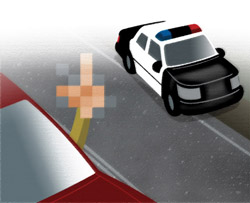'The Bird' Is the Word: Just Because You Can Doesn't Mean You Should

Illustration by Jeff Dionise
There are a lot of things one should not do in the presence of police officers. They’ve got a difficult and often dangerous job, and testing their limits just isn’t going to end well.
Rule of thumb: If you wouldn’t do it in front of your mother, don’t do it in front of a cop. Rule of middle finger: C’mon, did you really think it was a good idea?
References to insults that incorporate the middle finger can be found throughout recorded history, from ancient Roman literature to accounts of taunting on the battlefield. “Flipping the bird” to register one’s disdain is well-documented and—despite being a frequent reason for arrest and citation—perfectly legal, according to a multitude of court rulings. But that doesn’t mean cops have to like it.
A Denver man gave a one-finger salute to a police officer in April and was slapped with a criminal harassment charge. The perhaps aptly named Shane Boor was driving past another motorist who was being ticketed. Boor registered his feelings about the situation digitally and found himself facing a possible six months in jail.
The American Civil Liberties Union stepped in and maintained that Boor’s action was constitutionally protected free speech. In May, the chief of the Colorado State Patrol dropped the charge, deeming Boor’s actions “offensive and demeaning,” but not criminal.
That tracks with what appears to be a judicial trend. One often-cited decision came in 2009 from Judge David S. Cercone of the U.S. District Court for the Western District of Pennsylvania. He wrote in a 19-page opinion that “the United States Supreme Court has long recognized that nonverbal gestures and symbols may be entitled to First Amendment protection. … Moreover, several courts … have found that the expressive use of the middle finger is protected speech under the First Amendment.”
But again, if you’re prone to expressing yourself through various forms of gesticulation, maybe consider downsizing your repertoire a bit if you’re interacting with one of (insert your city name)’s finest.
Marlene Mells of Charleston, W.Va., was cited for driving too fast for conditions in April 2009. Three months later, after a bench trial where she was found guilty and ordered to pay about $160, she flashed a middle finger to three state troopers. They were not amused.
Mells was arrested for disruption of government process, put in jail until the next morning and released on $2,500 bond.
In July, Mells filed a lawsuit in the U.S. District Court for the Southern District of West Virginia against the troopers, alleging that they violated her right to free speech. In her complaint Mells says the Constitution gives her the “right to gesture with the middle finger and verbally criticize law enforcement officers.”
According to many court rulings just within the past few years, she’s right. And she might very well walk away from this whole sordid incident with a cash settlement.
But is sanctioned incivility a path we should be pursuing? Constitutional experts would likely answer yes, but Mom knows that’s not the way she raised you.



